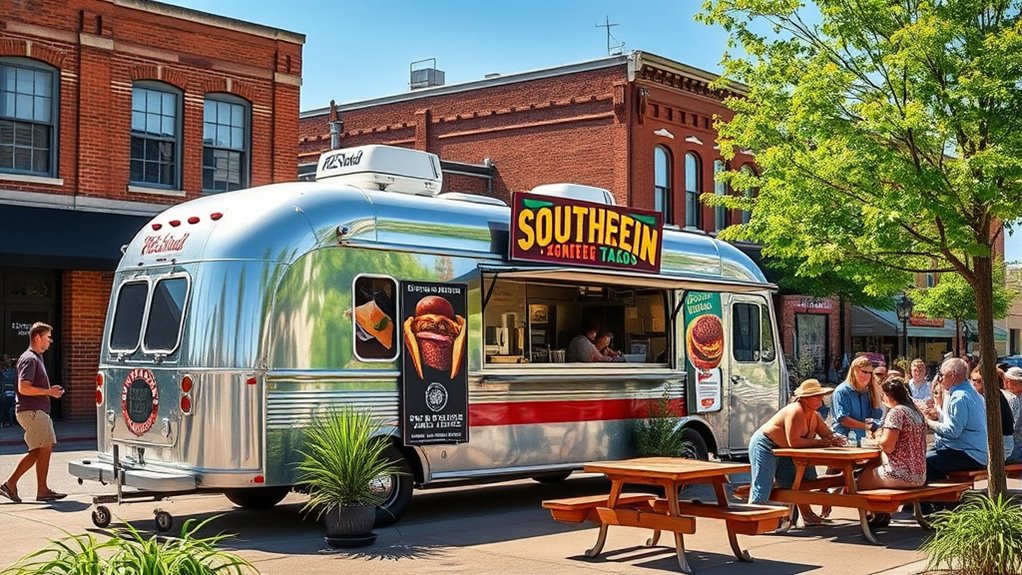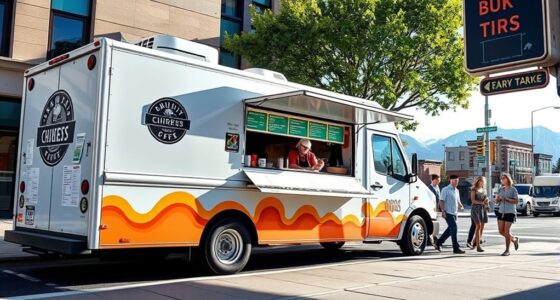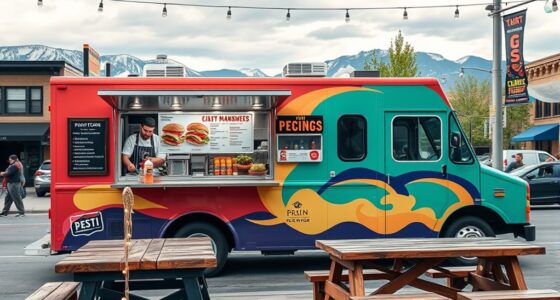Starting a food truck in Fort Smith involves obtaining permits like business licenses, health permits, and possibly temporary permits for events, costing around $25 to $200. You’ll need prime locations such as downtown areas, event venues, or markets to attract customers. Craft a menu highlighting local flavors and use approved suppliers. Effective marketing, social media presence, and participating in festivals help grow your business. If you want detailed tips for every step, continue exploring these essential aspects.
Key Takeaways
- Obtain necessary permits and licenses, including food service permits ($150–$200) and health department approvals, with self-contained truck design compliance.
- Budget startup costs between $50,000–$140,000, covering truck purchase, initial inventory, licensing, insurance, and marketing.
- Prime locations include downtown Garrison Avenue, Rogers Avenue, event venues, and outdoor markets for high foot traffic.
- Develop a menu featuring local Arkansas flavors like fried catfish, Possum Pie, and regional ingredients, ensuring food safety and allergen labeling.
- Engage customers via social media, participate in local festivals, and emphasize regional branding and sustainability to boost visibility and loyalty.
Navigating Permit Requirements in Fort Smith

Understanding permit requirements in Fort Smith involves grasping the specific licenses and permits needed to operate a food truck legally. You’ll need a business license, costing roughly $25 to $100, and a food service permit, usually between $150 and $200. A mobile food unit permit is mandatory, with fees around $150 to $200. You must also obtain a health department permit, ranging from $50 to $100. For short-term events, temporary retail food permits are available, valid for up to 14 days with at least three days’ notice. To apply, you’ll submit detailed layouts, including cooking, handwashing, and waste areas, plus a menu and pest control methods. New trucks require a Plan Review approval before getting a Food Service Permit, ensuring compliance with health standards. Additionally, it’s important to stay updated on any local ordinance changes that could affect your permit requirements. Considering the costs associated with licensing and permits can help you budget effectively for your food truck venture.
Estimating Startup Expenses and Ongoing Fees

Estimating startup expenses and ongoing fees is essential for planning a successful food truck business in Fort Smith. You’ll need between $50,000 and $140,000 to purchase or outfit a truck, with used vehicles costing less but possibly increasing maintenance later. New trucks with branding and kitchen equipment cost more upfront. Initial inventory typically runs $2,000 to $3,000. Licensing fees range from $25 to $200, with permits potentially adding up to nearly $2,000 depending on your specific licenses. Insurance costs, covering vehicle and liability, are ongoing expenses, while fuel ($500–$1,000 monthly) and maintenance also add up. Marketing, including branding and event participation, varies but is crucial for customer acquisition. Budget wisely to cover these initial and recurring costs for a smooth launch and operation. Regularly reviewing your expenses helps maintain profitability and adapt to changing costs. Additionally, understanding Hyundai Tuning options can be beneficial if you plan to use a custom or modified vehicle for your food truck, ensuring optimal performance and reliability.
Identifying Prime Locations for Food Truck Operations
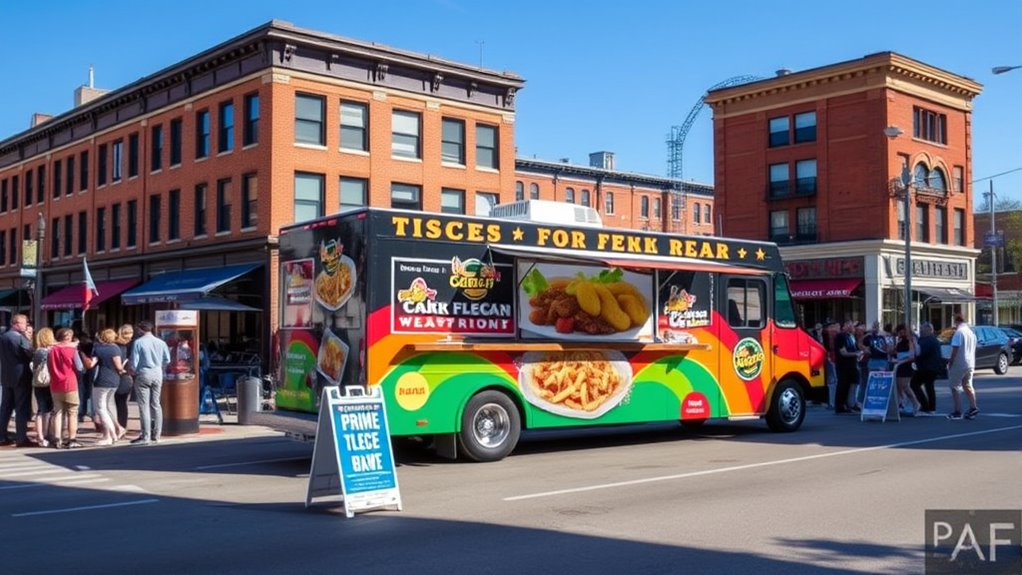
To maximize your food truck’s success in Fort Smith, you need to identify high-traffic locations that attract steady crowds. Downtown areas, event venues, and office districts offer prime opportunities for consistent foot traffic and sales. Choosing the right spots will help you build a strong customer base and boost your revenue. Fort Smith’s vibrant food truck culture thrives when trucks are strategically positioned in busy, popular areas.
Downtown High Traffic Areas
Identifying prime locations for food truck operations in downtown Fort Smith requires analyzing high traffic areas that balance vehicle flow and pedestrian activity. Garrison Avenue is the main commercial corridor, drawing steady foot traffic from tourists and locals alike, especially near historic sites and cultural attractions. Rogers Avenue attracts visitors along the True Grit Trail, increasing pedestrian presence. The intersection of Fifth Street and Garrison sees frequent vehicle delays and safety concerns, which can impact customer access. Efforts to re-route truck traffic on nearby streets may influence where you position your truck. The downtown district’s vibrant mix of shops, restaurants, and community events creates opportunities for strategic placement during peak hours, ensuring maximum visibility and customer engagement for your food truck. Recent traffic studies indicate that adjusting traffic flow and improving safety measures in the area can further enhance accessibility for food trucks and patrons alike, especially as AI detection technologies become more integrated into city planning and management.
Event Venue Hotspots
Event venues like festivals, community gatherings, and private celebrations are prime locations for food truck operations in Fort Smith because they attract large, diverse crowds enthusiastic for convenient, tasty options. The Fort Smith Food Truck Festival, held downtown, pulls in big crowds with food, music, and entertainment, providing excellent exposure for vendors. The Bakery District’s courtyard offers a lively urban setting that combines historic charm with modern amenities, drawing locals and visitors during events and regular activities. Wedding and private event catering also present lucrative opportunities, with established venues hosting weddings and parties that guarantee attendance. Additionally, entertainment districts outside downtown, like nightlife hubs and outdoor concert areas, draw evening crowds seeking casual bites. These hotspots maximize visibility, foot traffic, and sales potential for your food truck. Furthermore, outdoor markets and farmers’ markets are emerging as popular spots to reach health-conscious and community-oriented customers, boosting your sales potential in these vibrant settings.
Office and Industrial Zones
Office and industrial zones in Fort Smith offer promising locations for food truck operations by tapping into steady daytime crowds and limited existing food options. Industrial areas like the Airport North Commercial Park, with large parcels such as GOV VA FT SMITH LLC (~4.9 acres), attract employees from manufacturing and warehousing businesses. These zones usually have good vehicle access, parking, and fewer restrictions, though noise and activity levels can vary. Industrial zones typically have excellent vehicle access and parking, which can facilitate frequent visits and easier logistics. Office zones near commercial centers draw consistent lunchtime crowds of professionals, providing opportunities for diverse menus. To succeed, make sure your truck complies with city setback, pedestrian access, and permit regulations. Leveraging nearby main roads, utilities, and community events enhances visibility. Targeting shift changes and office breaks helps maximize your sales in these high-traffic zones. Additionally, many industrial and office zones are located close to key manufacturing and production companies, which can provide a regular customer base if approached strategically.
Crafting a Menu That Delights and Complies

To create a menu that stands out, you need to incorporate local flavors that resonate with your customers while ensuring full compliance with food safety regulations. Balancing regional ingredients with clear labeling and hygiene standards helps build trust and keeps your operation running smoothly. Focus on designing a menu that’s both appealing and aligned with health guidelines to maximize your food truck’s success. Incorporating popular grocery savings strategies can also help you manage ingredient costs effectively.
Local Flavor Integration
Integrating local flavor into your food truck menu requires balancing authenticity with broad appeal. You can highlight Arkansas staples like Steven’s Special—Mexican rice with fajita meat and housemade cheese dip—offering familiar comfort with regional flair. Including Possum Pie or fried catfish taps into local traditions, satisfying regional tastes. Hushpuppies and fried pickles add Southern character and serve as popular sides or starters. Incorporate regional ingredients like freshwater fish, cornmeal, and local produce to enhance authenticity while maintaining versatility. Be sure to respect cultural origins behind dishes, offering accurate descriptions to celebrate local diversity. Using regional ingredients can help your menu stand out and deepen customer appreciation for local culture. By blending regional favorites with international influences, you create a menu that delights locals and visitors alike, honoring Fort Smith’s rich culinary heritage.
Food Safety Compliance
Creating a menu that celebrates local flavors while guaranteeing food safety compliance requires careful planning and attention to detail. You must use ingredients that meet Arkansas Department of Health (ADH) regulations to prevent contamination. Clearly identify and avoid the 8 major allergens per FDA guidelines to protect your customers. Source ingredients from inspected, approved suppliers for traceability and safety. Minimize high-risk foods like raw eggs or unpasteurized dairy, or include proper handling instructions if used. Follow GMPs for preservation techniques such as refrigeration, acidification, and cooking to maintain safety and shelf life. Ensure all recipes adhere to strict hygiene practices, and staff are trained through ServSafe® or similar programs. Proper equipment, storage, and temperature controls are essential to prevent bacterial growth and guarantee food safety. Understanding the importance of food safety compliance can help protect both your customers and your business’s reputation.
Effective Marketing Strategies to Grow Your Business

Effective marketing is essential for food trucks looking to expand their customer base and boost sales. Leveraging social media platforms, especially Facebook, helps you reach local audiences and increase engagement. Consistent activity can lead to a 20% sales boost, with many customers discovering your truck through social media ads. Participating in local events and festivals boosts brand awareness and attracts foot traffic, creating networking opportunities. Implementing customer loyalty programs, like punch cards or digital rewards, can increase repeat visits by 30%. Using data analytics and mobile apps enhances your marketing efforts, providing insights and making it easier for customers to find you. Targeting Millennials and Gen Z with tailored content and emphasizing sustainability can also drive more traffic and foster loyalty in your Fort Smith market. Research indicates that digital tools like GPS and review platforms are crucial for better customer targeting and feedback management. Additionally, maintaining an active online presence through consistent content updates helps keep your audience engaged and informed about your location and offerings.
Ensuring Compliance and Operational Standards
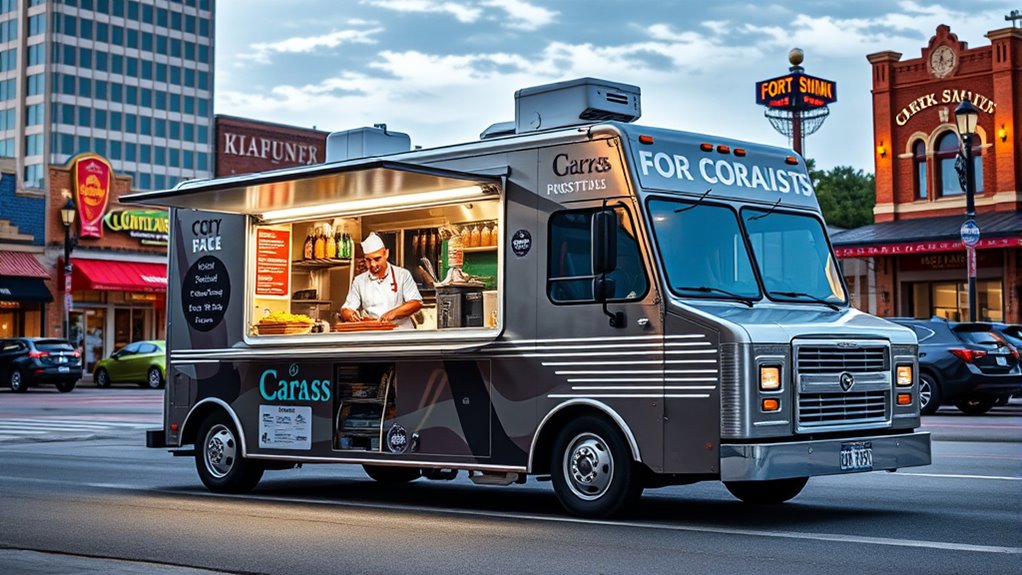
Ensuring compliance and meeting operational standards are crucial steps for food truck success in Fort Smith. You must design your truck as a self-contained unit with mounted water tanks and waste storage, following Arkansas health guidelines. Using approved commissary kitchens supports safe food prep and cleaning. Employee management requires documented protocols like an employee handbook. You’re responsible for collecting and remitting sales and local food taxes, maintaining accurate records for audits. Regular inspections ensure safety standards; trucks are classified by risk level, with corresponding inspection frequency. Keep detailed documentation, including menus, SOPs, and hygiene practices, ready for health reviews. Maintaining proper water & waste tanks and sanitation practices is essential to meet health standards and avoid penalties. Failure to comply can lead to fines or permit suspension. Stay proactive to operate smoothly and legally.
Frequently Asked Questions
How Long Does the Permit Approval Process Usually Take in Fort Smith?
You’re wondering how long the permit approval process takes in Fort Smith. Typically, it ranges from two to four weeks, depending on how complete your application is and if any revisions are needed. You should submit your plans at least three business days before your event for temporary permits, and keep in mind that longer-term permits might take a bit more time due to detailed reviews. Be sure to stay on top of renewals and requirements.
Are There Specific Health Inspections Required Before Opening?
Before opening, you’ll need to pass health inspections to guarantee your food truck meets safety standards. These include an initial inspection prior to operation, focusing on sanitation, temperature control, and contamination prevention. Fort Smith follows Arkansas state guidelines, so you’ll also need periodic inspections afterward. Staying compliant with these checks helps you avoid penalties and ensures your food truck operates safely and legally from day one.
Can I Operate a Food Truck Without a Physical Commissary Kitchen?
You can operate a food truck without a physical commissary kitchen, but your menu will be limited. Arkansas health regulations require a 3-compartment sink and proper sanitation, so if you prepare potentially hazardous foods, onboard facilities must meet strict standards. Without a commissary, you’ll need fully self-contained equipment, manage water and waste carefully, and focus on prepackaged or simple foods. This setup may restrict your menu options and increase operational challenges.
What Are the Most Cost-Effective Equipment Options for Startups?
Think of your startup as a building block tower—each piece needs to be sturdy yet affordable. You should start with essential appliances like a used griddle or fryer, choosing multifunctional and energy-efficient models to save bucks. Leasing high-cost equipment helps keep cash flow smooth. Focus on durable, low-maintenance gear, and shop local for deals. This strategic approach guarantees your food truck runs efficiently without breaking the bank.
How Do I Handle Sales Tax Collection and Remittance in Fort Smith?
Handling sales tax collection and remittance in Fort Smith is straightforward. You need to register your food truck with the Arkansas Department of Finance and Administration online before making sales. Collect the combined state and local sales tax at the point of sale, which can range from 8.5% to 9.0%. Remit the collected taxes through their system on a monthly, quarterly, or annual schedule, keeping detailed records for compliance.
Conclusion
Starting your food truck journey is like steering a ship through busy waters—you’ll need the right permits, a solid route, and a tempting menu. With clear navigation and a bit of market savvy, you’ll sail smoothly toward success. Keep your course steady, stay compliant, and use marketing as your lighthouse. Before long, you’ll be the guiding star of Fort Smith’s vibrant food scene, delighting customers and charting new territory with confidence.
